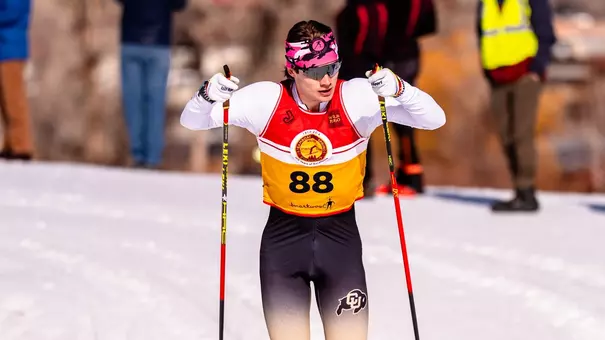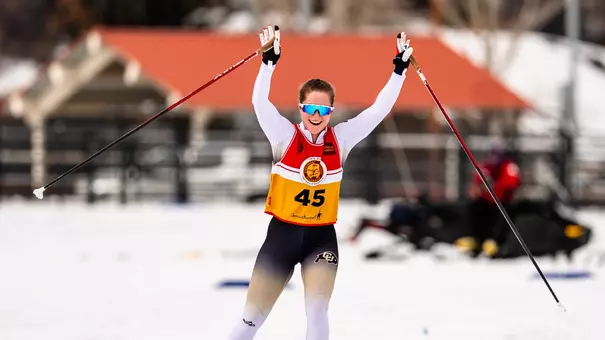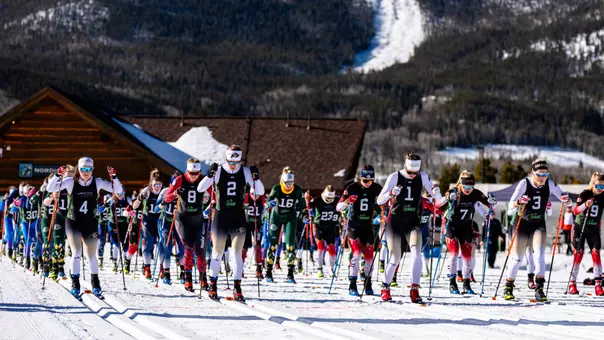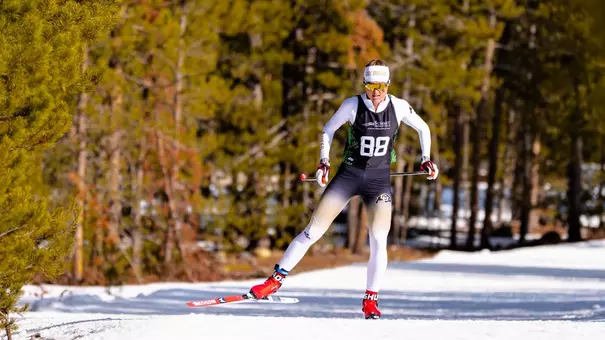Colorado University Athletics
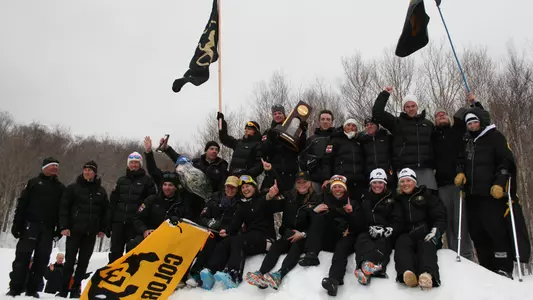
Last time the Buffs were in Stowe eight years ago, they won the NCAA Championship.
NCAA Championships 101: Why Skiing Is The Most Unique Championship In The NCAA
March 05, 2019 | Skiing
BOULDER - There are 24 sports for which the NCAA sponsors a championship across all divisions (I, II and III). In all, there are 90 national championship competitions contested annually.
All 90 of those championships are special, no doubt about it, but the National Collegiate Ski Championship is one like no other.
First, a little background:
National Collegiate & Coed
Not all championships are contended in each division. Some championships are contended across divisions and skiing is one of them. Along with skiing, others in that category include beach volleyball, bowling, fencing, men's and women's gymnastics, women's hockey, rifle, men's volleyball and water polo. That list pares down even further when looking at gender. Only three of the 90 championships are coed — skiing, rifle and fencing.
Four Sports In One
While there are certainly unique aspects of both rifle (small bore vs. air rifle) and fencing (sabre vs. foil vs. epee), skiing actually combines two very different types of skiing, alpine and Nordic. It's a coed sport but teams genders don't race against each other, so it's four different teams in one: men's alpine, women's alpine, men's Nordic and women's Nordic.
Individual Sports As Team Competitions
Skiing is not unique in the NCAA in that it takes primarily an individual sport and makes it a team competition. From cross country to golf to tennis, there are several other examples where the professional and Olympic level athletes are mainly individual entities but in college they make up a team.
So given all that, yes, skiing is unique. But that's only half the story.
It's not the only coed sport. It's not the only individual sport that competes as a team in the NCAA. It's not the sport competed across divisions. So why is skiing so unique?
One reason skiing is the world ranking system. World rankings for sports like tennis and golf take all results from a predetermined amount of time and calculate a list. For skiing, it's similar, except the average of the two best results are returned. As long as a skier has two finishes in a discipline, the best two finishes will be averaged and that calculates their FIS points, and thus their rankings.
In college skiing, finishing is the key element. Sure, some skiers try to finish all races, but if a skier has a mistake or misses a gate, only in college will that skier "hike" in order to finish the race. Why? Because the team performance trumps individual performance.
"I've always been a consistent skier throughout my career, it's always important for me to finish," CU senior Nora Christensen said. "But it's become even more important coming to college. If you don't finish, you don't count at all. Being a college skier is about being consistent. It's better to be top 5 throughout the season than winning one race and skiing out in four."
For those competing for season-long World Cup titles, finishing the most races you can is important. But for skiers trying to make it to the World Cup level, getting two wins is worth a whole lot more than finishing 10 races between fifth and 10th place.
Another unique part of college skiing is that some of the best skiers in the world are in the college ranks. CU's Mikaela Tommy was the No. 31 women's GS skier in the world in the recent rankings. Denver's Tuva Norbye is a top-40 ranked skier in the world in both slalom and GS. Utah's Roni Remme is top 20 in the world in slalom. The list goes on.
For many sports, college is the path to the best professional ranks. In those sports, it's arguable that the best players in the world go through colleges. Are there players who are in the top 40 in the world playing college basketball and football? Sure, some of them will eventually be All-Pro or All-Stars, but are they now? It's possible.
But to compare to college skiing, you'd have to go in reverse. Imagine Kobe Bryant or Lebron James going to college AFTER they were in the NBA for a year or two. Current rules prohibit such a thing, but it's still nearly impossible to imagine that would ever happen.
The last, and perhaps most important, way that college skiing is different is how the championship is conducted.
In the regular season, teams can have as many skiers as they want. Utah has 10 men's alpine skiers this season. Only six can count toward the team scores and of those six, the team points are calculated by taking the top three finishers. So if somebody skis out, it doesn't kill the team.
But at the NCAA Championships, teams can only qualify a maximum of three skiers in each discipline and gender, meaning a full team is one that has 12 skiers on it. At NCAA Regionals, teams can have their entire rosters, some upwards of 30 skiers, with up to 24 counting as a team and all competing for those 12 spots.
In what other team national championship do the best teams not bring their entire team to compete? Imagine basketball teams that have 12-15 players compete in the first four rounds of the NCAA Tournament having to show up to the Final Four with just five players.
"It's one of the toughest parts of my job," CU coach Richard Rokos said. "Telling the fourth-best skier they can't compete. It's heartbreaking in some cases, but there's nothing we can do about it. It's the nature of the business. I always try to present it that not everybody goes to the top of Mount Everest, but everybody is a part of it. It's an accomplishment for everybody, even if you don't ski at the end of the season."
The pressure that comes along with college skiing where it's important to finish is taken to the extreme at the NCAA Championships. In the regular season, if you don't finish a race, you have three other safety nets there on a full collegiate team. If two or even three ski out, your team can still calculate three point totals from that race. At the NCAA Championships, every single score counts. If you ski out, you get zero points.
"That's the reason NCAAs are so unique," Christensen said. "You only go three skiers deep, and every skier in every race counts. Not just for yourself, for the team. That's what makes is so special, you have to perform your best, you really want to perform your best for your team and you always have that pressure on you, that's what makes it different."
With the maximum amount of skiers you can qualify matching the minimum number of skiers that count toward the team score, pressure is at the max for skiers competing this week in Stowe, Vt., at the 66th annual NCAA Championships.
But that pressure and the teamwork it creates is one factor that attracts some of the best skiers in the world to the college ranks.
"The biggest difference is the team, the team spirit and teamwork," Christensen said. "When I was on the (Norwegian) national team, we were a team and we worked together to reach our goals, all separate goals. In college, you ski together throughout the season to reach one common goal, which is winning a national championship.
"Every race you do counts toward the team score, which is what's important," she continued. "It's cool to have a good race, the reason why it's so cool is because you can give your team a good score, which in the end benefits the score for the team."
The NCAA Skiing Championships are unique in the world of NCAA Championships and unique in the world of skiing. The Buffs have won 20 National Championships in skiing and coach Richard Rokos has been at the helm for eight of them.
This Wednesday through Saturday, the Buffs will try for championship No. 21. Hopefully as you see the results come through on CUBuffs.com each day or watch the live stream or live timing, now you can have an understanding of why this championship is unique.
All 90 of those championships are special, no doubt about it, but the National Collegiate Ski Championship is one like no other.
First, a little background:
National Collegiate & Coed
Not all championships are contended in each division. Some championships are contended across divisions and skiing is one of them. Along with skiing, others in that category include beach volleyball, bowling, fencing, men's and women's gymnastics, women's hockey, rifle, men's volleyball and water polo. That list pares down even further when looking at gender. Only three of the 90 championships are coed — skiing, rifle and fencing.
Four Sports In One
While there are certainly unique aspects of both rifle (small bore vs. air rifle) and fencing (sabre vs. foil vs. epee), skiing actually combines two very different types of skiing, alpine and Nordic. It's a coed sport but teams genders don't race against each other, so it's four different teams in one: men's alpine, women's alpine, men's Nordic and women's Nordic.
Individual Sports As Team Competitions
Skiing is not unique in the NCAA in that it takes primarily an individual sport and makes it a team competition. From cross country to golf to tennis, there are several other examples where the professional and Olympic level athletes are mainly individual entities but in college they make up a team.
So given all that, yes, skiing is unique. But that's only half the story.
It's not the only coed sport. It's not the only individual sport that competes as a team in the NCAA. It's not the sport competed across divisions. So why is skiing so unique?
One reason skiing is the world ranking system. World rankings for sports like tennis and golf take all results from a predetermined amount of time and calculate a list. For skiing, it's similar, except the average of the two best results are returned. As long as a skier has two finishes in a discipline, the best two finishes will be averaged and that calculates their FIS points, and thus their rankings.
In college skiing, finishing is the key element. Sure, some skiers try to finish all races, but if a skier has a mistake or misses a gate, only in college will that skier "hike" in order to finish the race. Why? Because the team performance trumps individual performance.
"I've always been a consistent skier throughout my career, it's always important for me to finish," CU senior Nora Christensen said. "But it's become even more important coming to college. If you don't finish, you don't count at all. Being a college skier is about being consistent. It's better to be top 5 throughout the season than winning one race and skiing out in four."
For those competing for season-long World Cup titles, finishing the most races you can is important. But for skiers trying to make it to the World Cup level, getting two wins is worth a whole lot more than finishing 10 races between fifth and 10th place.
Another unique part of college skiing is that some of the best skiers in the world are in the college ranks. CU's Mikaela Tommy was the No. 31 women's GS skier in the world in the recent rankings. Denver's Tuva Norbye is a top-40 ranked skier in the world in both slalom and GS. Utah's Roni Remme is top 20 in the world in slalom. The list goes on.
For many sports, college is the path to the best professional ranks. In those sports, it's arguable that the best players in the world go through colleges. Are there players who are in the top 40 in the world playing college basketball and football? Sure, some of them will eventually be All-Pro or All-Stars, but are they now? It's possible.
But to compare to college skiing, you'd have to go in reverse. Imagine Kobe Bryant or Lebron James going to college AFTER they were in the NBA for a year or two. Current rules prohibit such a thing, but it's still nearly impossible to imagine that would ever happen.
The last, and perhaps most important, way that college skiing is different is how the championship is conducted.
In the regular season, teams can have as many skiers as they want. Utah has 10 men's alpine skiers this season. Only six can count toward the team scores and of those six, the team points are calculated by taking the top three finishers. So if somebody skis out, it doesn't kill the team.
But at the NCAA Championships, teams can only qualify a maximum of three skiers in each discipline and gender, meaning a full team is one that has 12 skiers on it. At NCAA Regionals, teams can have their entire rosters, some upwards of 30 skiers, with up to 24 counting as a team and all competing for those 12 spots.
In what other team national championship do the best teams not bring their entire team to compete? Imagine basketball teams that have 12-15 players compete in the first four rounds of the NCAA Tournament having to show up to the Final Four with just five players.
"It's one of the toughest parts of my job," CU coach Richard Rokos said. "Telling the fourth-best skier they can't compete. It's heartbreaking in some cases, but there's nothing we can do about it. It's the nature of the business. I always try to present it that not everybody goes to the top of Mount Everest, but everybody is a part of it. It's an accomplishment for everybody, even if you don't ski at the end of the season."
The pressure that comes along with college skiing where it's important to finish is taken to the extreme at the NCAA Championships. In the regular season, if you don't finish a race, you have three other safety nets there on a full collegiate team. If two or even three ski out, your team can still calculate three point totals from that race. At the NCAA Championships, every single score counts. If you ski out, you get zero points.
"That's the reason NCAAs are so unique," Christensen said. "You only go three skiers deep, and every skier in every race counts. Not just for yourself, for the team. That's what makes is so special, you have to perform your best, you really want to perform your best for your team and you always have that pressure on you, that's what makes it different."
With the maximum amount of skiers you can qualify matching the minimum number of skiers that count toward the team score, pressure is at the max for skiers competing this week in Stowe, Vt., at the 66th annual NCAA Championships.
But that pressure and the teamwork it creates is one factor that attracts some of the best skiers in the world to the college ranks.
"The biggest difference is the team, the team spirit and teamwork," Christensen said. "When I was on the (Norwegian) national team, we were a team and we worked together to reach our goals, all separate goals. In college, you ski together throughout the season to reach one common goal, which is winning a national championship.
"Every race you do counts toward the team score, which is what's important," she continued. "It's cool to have a good race, the reason why it's so cool is because you can give your team a good score, which in the end benefits the score for the team."
The NCAA Skiing Championships are unique in the world of NCAA Championships and unique in the world of skiing. The Buffs have won 20 National Championships in skiing and coach Richard Rokos has been at the helm for eight of them.
This Wednesday through Saturday, the Buffs will try for championship No. 21. Hopefully as you see the results come through on CUBuffs.com each day or watch the live stream or live timing, now you can have an understanding of why this championship is unique.
Players Mentioned
Colorado Ski: Why CU?
Friday, June 27
Colorado Ski: 2025 Facility Tour
Tuesday, June 10
Colorado Ski: 2024-25 Banquet
Tuesday, April 22
2024 Ski Team Season Recap
Tuesday, April 30


